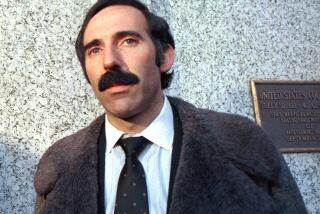Bilzerian Reportedly Is Target of SEC and Grand Jury Probes
- Share via
NEW YORK — Flamboyant financier Paul A. Bilzerian, now chairman of Singer Co., is the target of major Securities and Exchange Commission and federal grand jury investigations for possibly violating a litany of securities laws, a published report said Thursday.
The Wall Street Journal said documents it obtained and interviews conducted with business associates show that Bilzerian may have engaged in such crimes as insider trading, tax fraud, filing false documents with the SEC and “parking” stock in accounts that conceal its ownership.
The investigations stem from the Ivan F. Boesky insider trading scandal. The Journal also said new details of possible securities law violations surfaced in the SEC lawsuit filed last week against Ohio developer Edward DeBartolo Sr.
Bilzerian, an eccentric high school dropout who amassed a fortune through real estate, stock market speculation and takeover raids, used a number of possibly illegal tactics to “force large corporations into unwanted takeovers or liquidations that gained him hundreds of millions of dollars,” the Journal said.
A receptionist at Bilzerian’s office in Tampa, Fla., said the financier was traveling and could not be reached to comment on the Journal report.
Stuck Brokerage
In one case early on in his takeover career, Bilzerian secretly purchased and parked 58,000 shares of H. H. Robertson Co., a Pittsburgh construction company he said he would acquire for $250 million, the Journal said.
But Bilzerian never followed through with a formal bid and did not file any documents detailing his offer with the SEC, as required by law, the paper said. In the process, the Journal said, Bilzerian alienated Canada’s wealthy Belzberg family, which owned 17% of Robertson.
Bilzerian also reneged on an agreement to buy back the Robertson shares he parked at Jefferies & Co., leaving the Los Angeles securities firm with a $250,000 loss, the paper said.
Later, however, Bilzerian partly reimbursed Jefferies, and then sent the firm two phony invoices for $75,000 each when he learned the firm had recouped a good portion of the loss on its own, the Journal said.
In his next deal, the paper said, the Florida raider secretly enlisted the aid of DeBartolo in his bid for Cluett, Peabody & Co. SEC documents do not reveal any links between the two, but the Journal said DeBartolo bought large blocks of Cluett stock for himself and arranged for others to buy more, sometimes after talking with Bilzerian.
More to Read
Inside the business of entertainment
The Wide Shot brings you news, analysis and insights on everything from streaming wars to production — and what it all means for the future.
You may occasionally receive promotional content from the Los Angeles Times.










